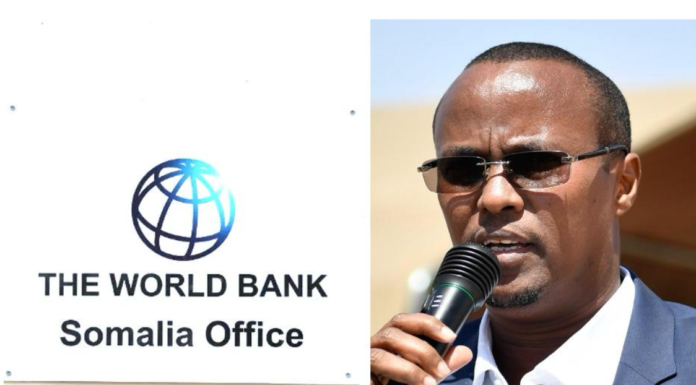The situation in Hirshabelle State concerning the diversion of World Bank-funded projects is becoming increasingly alarming. Two major initiatives, the Somalia Water for Rural Resilience Project (Barwaaqo) and the Food Systems Resilience Program, are at the centre of this storm.
The Barwaaqo project, aimed at enhancing water resilience in rural Somalia, has faced significant setbacks. Sources within the Hirshabelle state house, speaking under the condition of anonymity to Shabelle Media Network, have revealed that the project has been suspended due to attempts by the Hirshabelle Ministry of Planning to replace the Project Coordinator with a politically favoured individual. This action, allegedly orchestrated by the Hirshabelle presidency, has raised serious concerns about the project’s future.
Initially, the Hirshabelle administration sought to remove the Barwaaqo Project Coordinator without due process and in violation of World Bank procedures. Unfounded allegations were made against the coordinator, but an investigation later disproved these claims and recommended reinstatement, a decision that the World Bank supported, according to documents seen by Shabelle Media Network.
A World Bank spokesperson who contacted Shabelle Media Network had confirmed: “We take note of your story on July 16 alleging unfair dismissal of a government employee in a World Bank-financed project. We are aware of this case. The dismissal was investigated with the support of a Third-Party Monitor and in collaboration with the Federal Ministry of Planning, Investment and Economic Development. The investigation found there was no ground to terminate the Hirshabelle Project Coordinator’s contract and he was consequently reinstated. The investigation took into consideration Somalia’s HR policy and World Bank procedures for recruiting staff in supported projects.”
Despite this, Shabelle Media Network has learned that the Project Coordinator has not yet been officially reinstated. An official within the Hirshabelle administration suggested that the state house is applying pressure in hopes that the coordinator will eventually resign, allowing a favoured candidate to take the position, despite lacking the requisite qualifications. This move, according to insiders, is driven by a desire to control project funds and award contracts to preferred suppliers, who are believed to be instrumental in the upcoming re-election campaign of the current Hirshabelle administration.
“This is all about how much funds can be diverted from the Barwaaqo project and whom we can trust to carry out this diversion of funds and award contracts to preferred suppliers,” said an official at the Hirshabelle Ministry of Planning, who requested anonymity due to the sensitivity of the matter.
The World Bank spokesperson reiterated: “We would like to reiterate that the World Bank takes allegations of fraud and corruption in its financed projects very seriously. The World Bank’s Integrity Vice Presidency (INT) investigates allegations of fraud, corruption, collusion, coercion and obstruction in World Bank-supported activities, including allegations against World Bank staff. INT investigations rely heavily on the information that we receive, so we encourage people involved in activities supported by World Bank funds to report suspected fraud or corruption.”
Adding to the controversy, the Food Systems Resilience Program, another World Bank-funded project, appears to be facing similar issues. The recruitment process for the Hirshabelle Project Coordinator has reportedly been marred by favouritism, nepotism and lack of proper qualifications. Sources indicate that the recruitment, conducted at the Hirshabelle State House and overseen by a senior state house official, disregarded more qualified candidates in favour of the president’s preferred candidate. The selected individual’s CV allegedly contains unverified educational and experience credentials that were copied from the CV of other individuals, failing to meet World Bank standards.
The potential consequences of these recruitment practices are dire, as emphasised by one Hirshabelle MP. Mismanagement and fund diversion not only compromise the integrity of the project but also severely undermine their intended impact on local communities, threatening the very foundation of development efforts in the Federal Member State.
Shabelle Media Network is also investigating claims that contracts have been awarded to companies outside procurement procedures, allegedly based on favouritism and as part of a scheme to divert World Bank funds.





